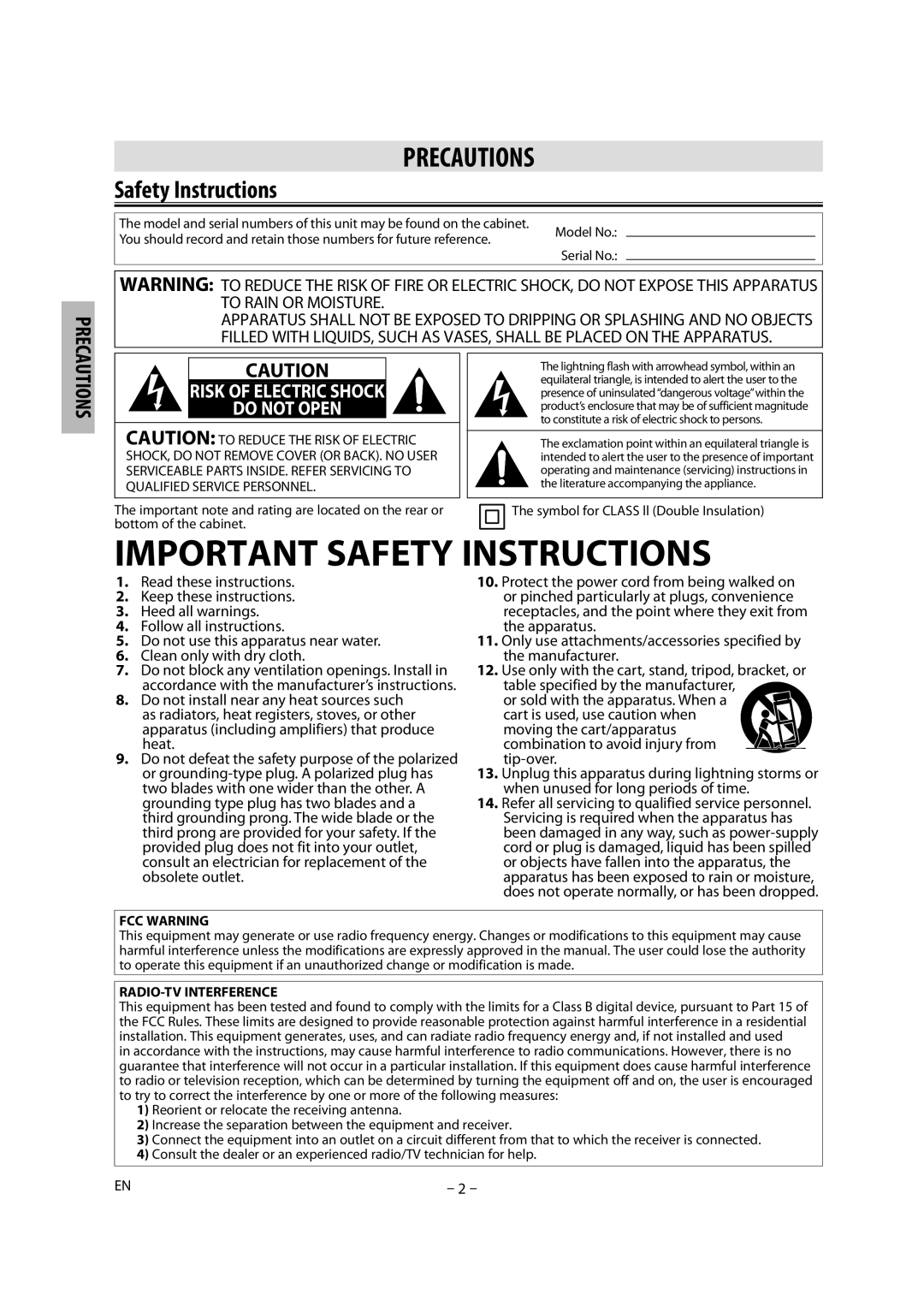
PRECAUTIONS
PRECAUTIONS |
|
|
|
|
|
|
|
Safety Instructions |
|
|
|
The model and serial numbers of this unit may be found on the cabinet. | Model No.: |
|
|
You should record and retain those numbers for future reference. |
|
| |
| |||
Serial No.: |
|
| |
|
|
|
WARNING: TO REDUCE THE RISK OF FIRE OR ELECTRIC SHOCK, DO NOT EXPOSE THIS APPARATUS TO RAIN OR MOISTURE.
APPARATUS SHALL NOT BE EXPOSED TO DRIPPING OR SPLASHING AND NO OBJECTS FILLED WITH LIQUIDS, SUCH AS VASES, SHALL BE PLACED ON THE APPARATUS.
| CAUTION | The lightning flash with arrowhead symbol, within an |
| equilateral triangle, is intended to alert the user to the | |
| RISK OF ELECTRIC SHOCK | |
| presence of uninsulated“dangerous voltage” within the | |
| DO NOT OPEN | product’s enclosure that may be of sufficient magnitude |
CAUTION: TO REDUCE THE RISK OF ELECTRIC | to constitute a risk of electric shock to persons. | |
The exclamation point within an equilateral triangle is | ||
SHOCK, DO NOT REMOVE COVER (OR BACK). NO USER | intended to alert the user to the presence of important | |
SERVICEABLE PARTS INSIDE. REFER SERVICING TO | operating and maintenance (servicing) instructions in | |
QUALIFIED SERVICE PERSONNEL. | the literature accompanying the appliance. | |
The important note and rating are located on the rear or | The symbol for CLASS ll (Double Insulation) | |
bottom of the cabinet. |
| |
IMPORTANT SAFETY INSTRUCTIONS | ||
1. | Read these instructions. | 10. Protect the power cord from being walked on |
2. | Keep these instructions. | or pinched particularly at plugs, convenience |
3. | Heed all warnings. | receptacles, and the point where they exit from |
4. | Follow all instructions. | the apparatus. |
5. | Do not use this apparatus near water. | 11. Only use attachments/accessories specified by |
6. | Clean only with dry cloth. | the manufacturer. |
7. | Do not block any ventilation openings. Install in | 12. Use only with the cart, stand, tripod, bracket, or |
8. | accordance with the manufacturer’s instructions. | table specified by the manufacturer, |
Do not install near any heat sources such | or sold with the apparatus. When a | |
| as radiators, heat registers, stoves, or other | cart is used, use caution when |
| apparatus (including amplifiers) that produce | moving the cart/apparatus |
| heat. | combination to avoid injury from |
9. Do not defeat the safety purpose of the polarized | ||
| or | 13. Unplug this apparatus during lightning storms or |
| two blades with one wider than the other. A | when unused for long periods of time. |
| grounding type plug has two blades and a | 14. Refer all servicing to qualified service personnel. |
| third grounding prong. The wide blade or the | Servicing is required when the apparatus has |
| third prong are provided for your safety. If the | been damaged in any way, such as |
| provided plug does not fit into your outlet, | cord or plug is damaged, liquid has been spilled |
| consult an electrician for replacement of the | or objects have fallen into the apparatus, the |
| obsolete outlet. | apparatus has been exposed to rain or moisture, |
|
| does not operate normally, or has been dropped. |
FCC WARNING
This equipment may generate or use radio frequency energy. Changes or modifications to this equipment may cause harmful interference unless the modifications are expressly approved in the manual. The user could lose the authority to operate this equipment if an unauthorized change or modification is made.
RADIO-TV INTERFERENCE
This equipment has been tested and found to comply with the limits for a Class B digital device, pursuant to Part 15 of the FCC Rules. These limits are designed to provide reasonable protection against harmful interference in a residential installation. This equipment generates, uses, and can radiate radio frequency energy and, if not installed and used
in accordance with the instructions, may cause harmful interference to radio communications. However, there is no guarantee that interference will not occur in a particular installation. If this equipment does cause harmful interference to radio or television reception, which can be determined by turning the equipment off and on, the user is encouraged to try to correct the interference by one or more of the following measures:
1)Reorient or relocate the receiving antenna.
2)Increase the separation between the equipment and receiver.
3)Connect the equipment into an outlet on a circuit different from that to which the receiver is connected.
4)Consult the dealer or an experienced radio/TV technician for help.
EN | 2 |
